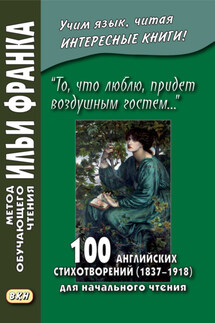«То, что люблю, придет воздушным гостем…» 100 английских стихотворений (1837–1918) для начального чтения = 100 English Poems (1837–1918) - страница 4
Elizabeth Barrett Browning
(1806–1861)
«How do i love thee? Let me count the ways…»
How do I love thee (как я люблю тебя)? Let me count the ways (позволь мне перечислить образы/способы /любви/; to count [kaʋnt] – пересчитывать; вычислять, подсчитывать, считать; way – путь; образ, способ).
I love thee to the depth and breadth and height (я люблю тебя до /той/ глубины, и ширины, и высоты; thee [ði:] – /уст., поэт./ тебе, тебя, тобой /личн. мест.: косвенный падеж от thou [ðaʋ] – ты/; breadth [bredθ] – ширина; height [haɪt] – высота)
My soul can reach, when feeling out of sight (/которых/ может достичь моя душа, когда устремляется из видимого мира; to feel – щупать, осязать, трогать, прикасаться; /= to feel about/ шарить, искать ощупью; ощущать, чувствовать; out – наружу; sight – зрение; поле зрения, видимость: to disappear [,dɪsə'pɪə] from sight – исчезнуть из поля зрения)
For the ends of Being and Ideal Grace (к пределам бытия и идеальной/совершенной благодати; end – конец, край; цель; ideal [aɪ'dɪəl] – идеал, образец, верх совершенства; идеальный, совершенный; воображаемый, мысленный; grace – грация; изящество; благодать; милость Господня).
I love thee to the level of every day’s (я люблю тебя до уровня ежедневной/повседневной; level ['lev(ə)l] – уровень; степень, ступень)
Most quiet need (самой спокойной потребности = как самую повседневную/простую потребность; need – надобность, нужда, physical ['fɪzɪk(ə)l] need – физическая потребность), by sun and candlelight (при солнечном свете и при свете свечи/в сумерках; candle – свеча; light – свет; candlelight ['kændllaɪt] – свет от свечи; сумрак, сумерки, полумрак /время, когда зажигают свечи/).
I love thee freely, as men strive for Right (я люблю тебя /так же/ свободно, как мужи борются за справедливость; to strive – стараться; стремиться, прилагать усилия: to strive for victory – стремиться к победе; бороться: to strive against fate – бороться с судьбой











